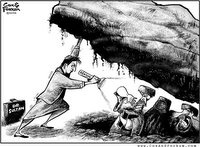Islamic Fundamentalism,. the Iraq War, Chianti, Etc

During the 1970s secular pan-Arab and quasi-socialist movements dominated the political debate in the Arab World. In the oil monarchies of the Persian Gulf local branches of the movements were giving the rulers some grief. Annoying questions were being raised about the use of oil revenues, financial corruption, etc. There was even talk about democracy, although it is doubtful what kind of democracy these movements believed in.
The rulers realized there was a huge pool of tribal people not interested in pan-Arab secularism. They learned to exploit the tribal, sectarian and ethnic divisions of their societies. They encouraged and financed new alliances that were a marriage of convenience between tribalism and Islamic fundamentalism. This approach, of course, had worked in Saudi Arabia for many decades, and was perfected by old Ibn Saud (King Abdul-Aziz), who unified much of the Arabian Peninsula early in the 20th century. Whether that was for good or bad depends on one’s perspective, whether one is a Hasawi Shi’a sitting atop the oil fields but nor reaping much benefits from them or a Wahhabi in Najd sitting atop a desolate desert but getting rich from the revenues of the same oil fields. Ibn Saud, whatever one thinks of the absolutely corrupt and schizophrenic system that inherited his domain, was a puritan and had elements of greatness. He is perhaps the closest the Arabs have had to a true warrior-leader in modern times. He was not a patriot like Garibaldi- he was interested in power for himself and his clan. Besides, I understand that Ibn Saud preferred the fresh milk of his Noo’q she-camels to a hearty Chianti with his Mutton a la Parmesana.
Islamic fundamentalists generally do not give a jella, that is a camel chip to most of you, about political freedom, free speech (religious freedom is a no no), or financial corruption. As long as the basic tenets of the faith are enforced, and as long as they control the educational system. As long as men and women are separated to keep at bay the ever-present evil of temptation. Under the prevailing arrangements, the ruling potentates and their supporting oligarchies can do whatever they want with the oil revenues, which they certainly do, as long as they give the Islamo-political societies the freedom of organization, fund-raising, and the control of education (perhaps the UAE is one glaring exception to all this). The fundamentalist Salafis presumably rely on quotes from someone called Abu Huraira (Father of Little Cat), a supposed contemporary of the Prophet Mohammed, to justify their alliance of convenience with the rulers. Quotes attributed by that ancient gentleman to the Prophet, such as “He who sees something despicable in his ruler should bear it, as long as the prayers are held. For he who even slightly disassociates himself from obedience to the sovereign and dies in this condition shall die the death of Jahiliyya (i.e. a heretic).”
Of course the al-Qaida have clearly departed from this philosophy now, perhaps realizing that all those ancient Semitic prophets, whether Arab or Jew, were in fact rebels against the existing order of their day.
But what about their Salafi friends and admirers in the Persian Gulf states?
The end of the Afghan war against the Soviet-backed regime also ended the honeymoon between the rulers and tribal-fundamentalists, although the marriage itself has continued. The young people who went to the war came back toughened, more indoctrinated, and less willing to compromise. They had been out of sight and supervision of their allies, the rulers, and had become independent. A sort of War of the Roses (the Hollywood version) has been going on for a while now. How will it all end? Will the new Salafi-Ba’athist Jihad in Iraq revive the faltering marriage?? Do we have the makings of a new threesome here? A ménage-a-trois in Iraq of Jihadists, Ba’athists, and Petro-money??
Cheers
MHG/phd
No comments:
Post a Comment